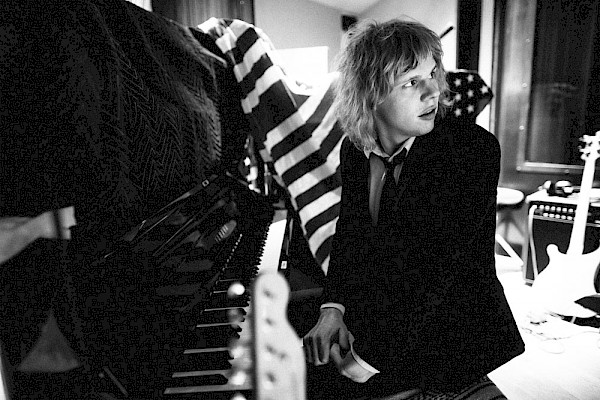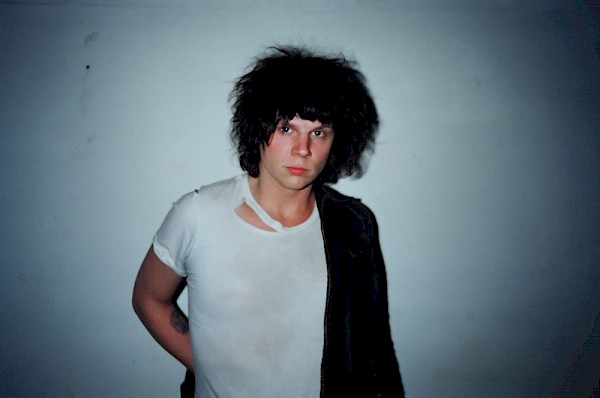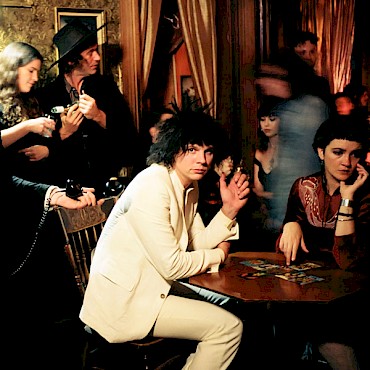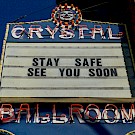 Kyle Craft recording at Chris Funk’s (Red Fang, Langhorne Slim, Sallie Ford, Rhett Miller, Y La Bamba) Halfling Studios in NW Portland, October 2016: Photo by Jason QuigleyThere is no shortage of rock and roll parables at this stage in the canon of the genre. Beyond merely a musical category, rock and roll exists as a lifestyle, a support system, and even a savior to some. And if you’re paying attention to its purveyors closely enough, familiar repetitions will begin to rise to the surface. Whether a place for rebels, for wanderers, or for the heartbroken, there are relatable touchstones for nearly anyone who listens to it, which is why so many people do. That said, Kyle Craft seems to be the unwitting archetype for rock and roll music in 2018, embodying the spirit and history of the art form. He’s a name you will undoubtedly begin to hear and read much more about.
Kyle Craft recording at Chris Funk’s (Red Fang, Langhorne Slim, Sallie Ford, Rhett Miller, Y La Bamba) Halfling Studios in NW Portland, October 2016: Photo by Jason QuigleyThere is no shortage of rock and roll parables at this stage in the canon of the genre. Beyond merely a musical category, rock and roll exists as a lifestyle, a support system, and even a savior to some. And if you’re paying attention to its purveyors closely enough, familiar repetitions will begin to rise to the surface. Whether a place for rebels, for wanderers, or for the heartbroken, there are relatable touchstones for nearly anyone who listens to it, which is why so many people do. That said, Kyle Craft seems to be the unwitting archetype for rock and roll music in 2018, embodying the spirit and history of the art form. He’s a name you will undoubtedly begin to hear and read much more about.
Craft’s story begins in Vidalia, La., a town of 4,000 or so citizens just across the Mississippi River from Natchez, Miss., a region known for its concentrated number of antebellum homes, where the specters of certain Southern values still loom beyond their welcome. After high school, Craft moved to Monroe, where his parents were under the impression he’d obtain a four-year college degree. Instead, he enrolled in a two-year community college, and after finishing he informed his folks of a left turn in his plans.
“After I got a degree there I was like, ‘Alright, I’m gonna go to Austin and not do the school thing; but I’m gonna start a band!’” Craft tells.
So began a journey for Craft that saw his former band, Gashcat, tour all over the West Coast, some of the East Coast, land gigs at South by Southwest, and ultimately cultivate friendship cells all over the country, most notably in Portland.
“Growing up, to be honest, I don’t remember having any sort of thirst for the world outside,” Craft says. Life as a musician changed that. “We would always book these tours ourselves, and it was way more of a road trip than a tour,” which afforded Craft the opportunity to explore new places. “I had to get my heart broken really hard to sort of be activated, to snap out of that whimsical lifestyle.”
 Photo by Jeremy Kale PadotCraft is referring to the breakup of Gashcat, precipitated by the dissolving of an eight-year relationship with his ex-girlfriend and bandmate. The fallout from that traumatizing period in his life—which also included an unrequited love back in Shreveport before he ultimately chose to relocate to Portland—yielded a mental and emotional metamorphosis, as well as a musical rebirth.
Photo by Jeremy Kale PadotCraft is referring to the breakup of Gashcat, precipitated by the dissolving of an eight-year relationship with his ex-girlfriend and bandmate. The fallout from that traumatizing period in his life—which also included an unrequited love back in Shreveport before he ultimately chose to relocate to Portland—yielded a mental and emotional metamorphosis, as well as a musical rebirth.
“When I got to Portland, I was like, ‘Okay, I’m gonna self-destruct here. I’m gonna wreck myself here, but I’m gonna make it really fucking fun,’” Craft recalls. “I had a good year of just going full-speed ahead. Now that I’m on the other side of it, it feels like I’ve been baptized or something. I’m more clear-headed on everything.”
That clarity helped Craft helm his debut solo record Dolls of Highland in 2015, a record he engineered on a laptop and performed himself in a friend’s laundry room. The album was later mixed by Brandon Summers and Benjamin Weikel of The Helio Sequence, and in 2016 became Craft’s first record for the seminal Seattle indie label Sub Pop. On February 2, Sub Pop will release Craft’s sophomore effort, Full Circle Nightmare, a decidedly more robust, cleansing spin of rollicking barn burners that sprawl into the timeless territory of rockers like Neil Young, Ryan Adams, Bob Dylan and Tom Petty. Throughout the record, Craft expounds poetic vignettes of his life’s tribulations in starkly honest snapshots, touching on turmoil and forgiveness, love and confusion, heartbreak and resolve. There is no buffer between the lyricism and the man who penned it, which makes for a distressing listen at times.
“On the first record, I was a little more rooted in ambiguity,” Craft says. “This one, you can hear the story without making up your own story to it. I struggle with that because when you write something honest it’s like, that’s exactly what happened. This person’s gonna know. I know. It might come off as really pent-up drama. But I don’t think of it in that way. I’m very aware that when you get up there and yell, ‘My heart is broken!’ that people are gonna be like, ‘Oh, poor soul.’ But I like when I hear that in an artist or when I see that in general. It’s like a naked picture, you nude on a billboard. To me that’s just kind of the way to do it.”
 The album artwork for 'Full Circle Nightmare'—out February 2 on Sub Pop—was taken at SE Portland's The Pied Cow CoffeehouseFor the production of Full Circle Nightmare, Craft joined forces with Chris Funk, multi-instrumentalist for The Decemberists and Black Prairie, marking the first time Craft recorded an album in a real studio. Full Circle Nightmare also literally embraces Craft’s Portland haunts, with song titles as unambiguous as “Belmont (One Trick Pony)” and “Bridge City Rose.” Craft also filmed videos for album singles “Heartbreak Junky” and “The Rager” in SE Portland spots The Pied Cow Coffeehouse (also the setting for the record’s cover) and The Liquor Store, respectively.
The album artwork for 'Full Circle Nightmare'—out February 2 on Sub Pop—was taken at SE Portland's The Pied Cow CoffeehouseFor the production of Full Circle Nightmare, Craft joined forces with Chris Funk, multi-instrumentalist for The Decemberists and Black Prairie, marking the first time Craft recorded an album in a real studio. Full Circle Nightmare also literally embraces Craft’s Portland haunts, with song titles as unambiguous as “Belmont (One Trick Pony)” and “Bridge City Rose.” Craft also filmed videos for album singles “Heartbreak Junky” and “The Rager” in SE Portland spots The Pied Cow Coffeehouse (also the setting for the record’s cover) and The Liquor Store, respectively.
The regional immediacy of Craft’s unfiltered lyrical lens on Full Circle Nightmare engenders an intimate listen. Craft admits that his confidence in that kind of autobiographical songwriting took a while to develop, and that he struggled with overcoming critical chatter when his music initially began to gain recognition.
“I never thought I’d get a record deal,” he admits. “I always hoped for that. I had to learn how to make music for me and no one else. Before, it always bummed me out if somebody didn’t like my music. It’d be like showing up at a party with a dog that you loved, and people going, ‘This is a really shitty dog. Your dog is ruining this party.’ And at some point you’re gonna be like, ‘I love that dog.’ I learned how to love my dog.”
With a third single released in early January—the Americana boogie-centered “Exile Rag”—Craft is poised for a huge 2018. A spring tour has been mapped out that will likely introduce him to newer and larger audiences, whether at SXSW or later opening for Dr. Dog, regardless of the sometimes baffling stylistic tags the general press choose to describe Craft’s music.
“To me, it’s just rock and roll,” Craft says. “But I think it’s funny when other people are like, ‘Yeah man, it’s swamp-glam rock!’ What does that mean? The general consensus is that I am this Southern swamp-glam thing. If David Bowie got up there and did Ziggy Stardust dressed like Elvis Presley’s bands, it would still be good on the record, ya know what I mean? That’s not what glam is.
“I don’t know if these people have seen a picture of me, but if I saw me on the street, I wouldn’t be like, ‘There’s a glam rocker!’”







